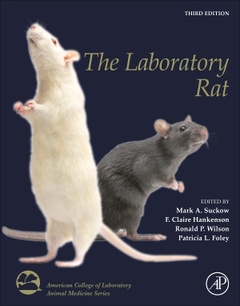Description
The Laboratory Rat (3rd Ed.)
American College of Laboratory Animal Medicine Series
Coordinators: Suckow Mark A., Hankenson F. Claire, Wilson Ronald P., Foley Patricia L.
Language: English
Subjects for The Laboratory Rat:
Keywords
rat models; rat research models; alcoholism; diabetes; metabolic syndrome; obesity; neuroscience; spinal cord injury; traumatic brain injury; biomaterials evaluation; infectious disease; rat clinical care; rat disease; rat biology; rat care; rat clinical pathology; rat reproduction; rat breeding; rat breeding; rat nutrition; rat housing; rat medical management; rat diagnostic approaches; rat bacterial pathogens; rat mycoplasmal pathogens; rat mycotic pathogens; rat viral pathogens; rat parasites; rat neoplastic disease; rat metabolic disease; rat traumatic disease; rat anesthesia; rat analgesia; rat euthanasia
1180 p. · 21.4x27.6 cm · Hardback
Description
/li>Contents
/li>Readership
/li>Biography
/li>Comment
/li>
The third edition of The Laboratory Rat features updated information on a variety of topics, including rats as research models for basic and translational research in areas such as genomics, alcoholism, diabetes, metabolic syndrome, obesity, neuroscience, spinal cord injury, traumatic brain injury, regenerative medicine, and infectious disease. New information related to the husbandry and veterinary care of rats is provided including topics related to nutrition, reproduction, anesthesia and surgery, infectious and noninfectious disease, and the care of surgical and other fragile models. It is a premier source of information on the laboratory rat, this book will be of interest to veterinary and medical students, senior graduate students, postdocs and researchers who utilize animals in biomedical research.
Background of the laboratory rat 1. Historical Foundations 2. Taxonomy and Stocks and Strains 3. Translational Potential of Rats in Research
Biology and care 4. Functional Anatomy and Physiology 5. Clinical Pathology of the Rat 6. Reproduction and Breeding 7. Assisted Reproductive Technologies and Genetic Modification in Rats 8. Analysis of Behavior in Laboratory Rats 9. Nutrition 10. Housing and Environment
Clinical care and disease 11. Medical Management and Diagnostic Approaches 12. Bacterial, Mycoplasmal, and Mycotic Infections 13. Viral Disease 14. Parasitic Diseases 15. Neoplastic Disease 16. Metabolic, Traumatic, and Miscellaneous Diseases 17. Anesthesia, Analgesia, and Euthanasia 18. Care of Surgical and Other Fragile Models
Rats as research models 19. General Experimental Techniques 20. Integrating Biology with Rat Genomic Tools 21. Gnotobiotics and the Microbiome 22. Toxicology 23. Embryology and Teratology 24. Rat Immunology 25. Cardiovascular Research 26. Rat Models of Alcohol Use Disorder 27. Rat Models of Obesity, Metabolic Syndrome, and Diabetes 28. The Rate in Neuroscience Research 29. Rat Models of Central Nervous System Injury 30. Use of the Rat as a Model in Regenerative Medicine 31. Rat Models of Infectious Disease
veterinarians, researchers who use rats in their experiments – aging researchers, drug addiction, cancer, spinal cord injury, cardiovascular disease, Alzheimer’s disease, spontaneous diabetes, arthritis, for example.
F. Claire Hankenson, DVM, MS, is the Director of MSU Campus Animal Resources and Attending Veterinarian at the Michigan State University. Research interests are refinements in the case and use of animals involved in research studies, particularly rodent clinical medicine, tail biopsy evaluations and humane endpoints.
Ronald P. Wilson, VMA, MS, DACLAM, is the Professor and Chair of Comparative Medicine at Pennsylvania State University. Research interests are related to experimental surgery, pain, analgesia and anesthesia of laboratory animals.
Patricia L. Foley, DVM, DCLAM, is the Director, Division of Comparative Medicine at Georgetown University.
- New chapters on the care of surgical and fragile models and on the use of rats in research areas such as alcoholism, regenerative medicine, spinal cord injury, traumatic brain injury, and others are included.
- All chapters were written by scientific and veterinary experts.
- This book condenses information from many sources on topics related to the care and use of rats in research.
- It is the premier source of information on the laboratory rat.




